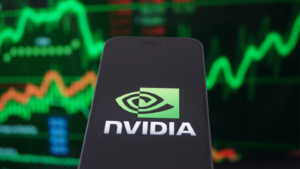
If you want to secure your financial future (and who doesn’t, really?), then one of the best things you can do is invest in blue-chip stocks.
Blue-chip stocks are the best of the best. They are widely known for their stable performance, strong financial performance, and sterling reputation.
They are popular picks for investors looking for a long-term play because blue-chip stocks can be counted upon for consistent, positive performance over years.
Blue-chip stocks are also those that are considered to be market leaders – because they’re doing something right. When choosing a blue-chip stock, you’re not getting a speculative play. Instead, you’re choosing a stock that has a track record of success.
I’ve used the Portfolio Grader to find some A-rated blue-chip stocks to consider now. These names are readily known for their excellent products, but they also make top-notch choices for your investment portfolio.
Nvidia (NVDA)

I continue putting my money on Nvidia (NASDAQ:NVDA), and why not? This chipmaker is one of the biggest success stories on Wall Street this year, and its most recent earnings indicate that the growth story has a long way to go.
Earnings for the company’s fiscal Q2 2024 included revenue of $13.51 billion (a new company record) up 101% from a year ago and 88% from the first quarter.
Net income was $6.19 billion, or $2.48 per share. A year ago, those numbers were only $656 million and 26 cents per share.
“A new computing era has begun. Companies worldwide are transitioning from general-purpose to accelerated computing and generative AI,” CEO Jensen Huang said.
The company is guiding for Q3 revenue of $16 billion. That’s a ridiculous number, but I have no doubts that Nvidia will hit it.
NVDA stock is up 233% this year, and it has an “A” rating in the Portfolio Grader.
Walmart (WMT)

Walmart (NYSE:WMT) hasn’t had the growth that Nvidia enjoyed so far this year, but it’s still a tremendous blue-chip stock. You don’t get any bluer than this blue-chip stock. Walmart is the world’s biggest retailer and has more than 10,500 locations. Global sales last year topped $600 billion.
That’s an amazing number for a brick-and-mortar retailer in today’s age of online sales. But Walmart is quickly becoming a major online retailer, with sales of $82.1 billion in the 2023 fiscal year.
Walmart also is strategically positioned to prosper in the brick-and-mortar space. The company sells everything from electronics to home furnishings to groceries. It uses its negotiating heft to drive prices down from suppliers so it can cater to budget-conscious consumers.
Walmart brought in $161.6 billion in revenue for Q2 and earnings per share of $1.84. It also gives investors a modest dividend yield of 1.5%.
WMT stock is up 12% this year and has an “A” rating in the Portfolio Grader.
Netflix (NFLX)

Netflix (NASDAQ:NFLX) is enjoying a rebirth this year. The stock is up 45%, and profits have never been higher.
After years of turning a blind eye to the practice of password sharing, Netflix finally decided that it was leaving too much money on the table. The streaming service company launched a program to require those who are sharing their password outside of their household to pay an extra $8 per month.
Now the paid sharing policy is successfully rolled out to more than 100 countries that Netflix serves, representing 80% of its subscriber base.
In the second quarter of 2023, the company said it’s gotten an extra 5.9 million subscriptions from the policy, bringing in more than $47 million in additional revenue. Netflix says it will roll out the policy to remaining customers this year.
That’s a huge turnaround that was long overdue. Password sharing was a direct contributor to Netflix reporting its first subscriber loss in a decade last year.
Netflix’s revenue was $8.19 billion in Q2, and the company is projecting Q3 revenue of $8.5 billion. The stock has an “A” rating in the Portfolio Grader.
Eli Lilly & Co. (LLY)

I suppose you could wait until the Food & Drug Administration gives a final signoff for Eli Lilly & Co. (NYSE:LLY) to sell its new Mounjaro drug as a treatment for obesity. But if you did, you’d probably be leaving a lot of money on the table.
Mounjaro is already a blockbuster – Lilly began selling it last year as a treatment for diabetes, and the drug is already bringing in $1 billion in sales each quarter.
But if the FDA agrees to allow doctors to prescribe Mounjaro for obesity (and some of them are doing it already) then Lilly could see annual revenues of $25 billion just from that product.
LLY stock is up 50% this year as some investors are already expecting the FDA approval. But it’s not too late to take a position. LLY stock has an “A” rating in the Portfolio Grader.
Broadcom (AVGO)

Semiconductor company Broadcom (NASDAQ:AVGO) is reporting its fiscal Q3 2023 earnings on August 31, but analysts are expecting some good news. Analysts at Piper Sandler raised their price target ahead of the earnings report, jumping from $830 to $925.
The firm said it’s expecting a “beat and raise” from AVGO stock, with strong guidance based on expected higher demand for smartphones.
Broadcom also expects its semiconductor revenue for AI businesses to increase from 15% to 25% next year.
Broadcom is also expected to close its deal with cloud-computing company VMWare (NYSE:VMW) soon. The European Union and the U.S. have already signed off on the deal, so the company is just waiting for Beijing regulators to follow suit.
AVGO stock is up 60% this year and pays a dividend yield of 2%. It has an “A” rating in the Portfolio Grader.
General Electric (GE)

General Electric (NYSE: GE) is proof that bigger isn’t always better with successful blue-chip stocks. GE’s been in the process of shedding unprofitable businesses and the results have been a company that is leaner and much more appealing.
GE sold off its appliance business, dumped NBC Universal, and jettisoned its signature light bulb business.
It also got rid of GE Capital, which at one point was one of the biggest drivers of GE’s profits but became toxic following the housing crisis and collapse of the subprime mortgage industry.
Today, GE is laser-focused on aerospace, renewable energy and power, making commercial and defense aircraft engines, wind turbines and gas turbines.
The result is a company that’s projected to more than double its adjusted earnings per share this year (from 77 cents in 2022 to between $1.60 and $2 per share in 2023).
GE stock is up 76% in 2023 and has an “A” rating in the Portfolio Grader.
Halliburton (HAL)

Oilfield services company Halliburton (NYSE:HAL) has a global presence in serving the upstream oil and gas industry by offering cementing, well construction and completion services.
Oil prices have been on the rise as of late and will likely continue their upswing following Hurricane Idalia’s pounding of the Gulf Coast. The Gulf accounts for 15% of U.S. oil production and 5% of global oil production.
Halliburton is dependent on oil prices to maximize profits, and with the price of oil down slightly this year, the stock price followed suit. HAL stock is roughly flat this year, although it’s gained more than $30 since May.
Revenue in the second quarter came in at $5.8 billion, an increase of 14% from a year ago. Earnings per share of 77 cents was up more than 50% from a year ago.
Analysts at USB increased their price target on HAL stock from $49 to $52 and maintained its buy rating. HAL has an “A” rating in the Portfolio Grader.
On the date of publication, Louis Navellier had a long position in NVDA. Louis Navellier did not have (either directly or indirectly) any other positions in the securities mentioned in this article.
The InvestorPlace Research Staff member primarily responsible for this article did not hold (either directly or indirectly) any positions in the securities mentioned in this article.
Technology, Artificial Intelligence, Healthcare, Biotech, Cloud, Consumer Discretionary, Consumer Staples, Food, Industrial, Energy, Oil, Semiconductor, Communications, Media, Streaming




